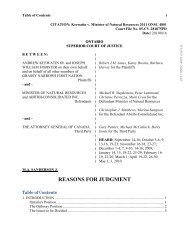Cronk v. Canadian General Insurance Co., 1995 CanLII 814 (ON CA)
Cronk v. Canadian General Insurance Co., 1995 CanLII 814 (ON CA)
Cronk v. Canadian General Insurance Co., 1995 CanLII 814 (ON CA)
You also want an ePaper? Increase the reach of your titles
YUMPU automatically turns print PDFs into web optimized ePapers that Google loves.
The conclusion of the motions court judge based on the studies prepared by the<br />
<strong>Co</strong>uncil of Ontario Universities are obviously not so generally known or accepted<br />
as to challenge the validity of an established principle which has found judicial<br />
acceptance for over three decades. It is not, as the respondent contended, an<br />
undisputed "social reality" as was the background information concerning the<br />
circumstances encountered by spouses at the dissolution of a marriage, in Moge v.<br />
Moge, 1992 <strong>CanLII</strong> 25 (S.C.C.), [1992] 3 S.C.R. 813 at 874.<br />
Before taking new matters into account based on statistics which have not been<br />
considered in the judgment under appeal, the adversarial process requires that the<br />
court ensure that the parties are given an opportunity to deal with the new<br />
information by making further submissions, oral or written, and allowing, if<br />
requested, fresh material in response.<br />
The result arrived at has the potential of disrupting the practices of the commercial<br />
and industrial world, wherein employers have to predict with reasonable certainty<br />
the cost of downsizing or increasing their operations, particularly in difficult<br />
economic times. As well, legal practitioners specializing in employment law and<br />
the legal profession generally have to give advice to employers and employees in<br />
respect of termination of employment with reasonable certainty. Adherence to the<br />
doctrine of stare decisis plays an important role in that respect: Cassell & <strong>Co</strong>. Ltd.<br />
v. Broome, [1972] 1 All E.R. 801 at 809 (H.L.).<br />
VIII C<strong>ON</strong>CLUSI<strong>ON</strong> AND DISPOSITI<strong>ON</strong><br />
In my opinion, the character of the employment of the respondent does not entitle<br />
her to a lengthy period of notice. As pointed out by Saunders J. in Bohemier v.<br />
Storwal International Inc., supra, at p. 269:<br />
It seems to me that the character of the employment of<br />
the plaintiff with Storwal does not entitle him to a<br />
lengthy period of notice on the basis of decided cases<br />
and the reasons I have stated. If the issue had been<br />
addressed at the time he was first employed, it would<br />
not have been reasonable for his employer to have<br />
agreed to a notice period sufficient to enable him to<br />
find work in difficult economic times. In saying this, I<br />
hope that it is not thought that I am unsympathetic to<br />
the plight of the plaintiff. His claim, however, is based<br />
on contract and it is not reasonable to expect that his<br />
employer would or could have agreed to assure that his<br />
notice of termination would be sufficient to guarantee<br />
that he would obtain alternative employment within<br />
the notice period.
















